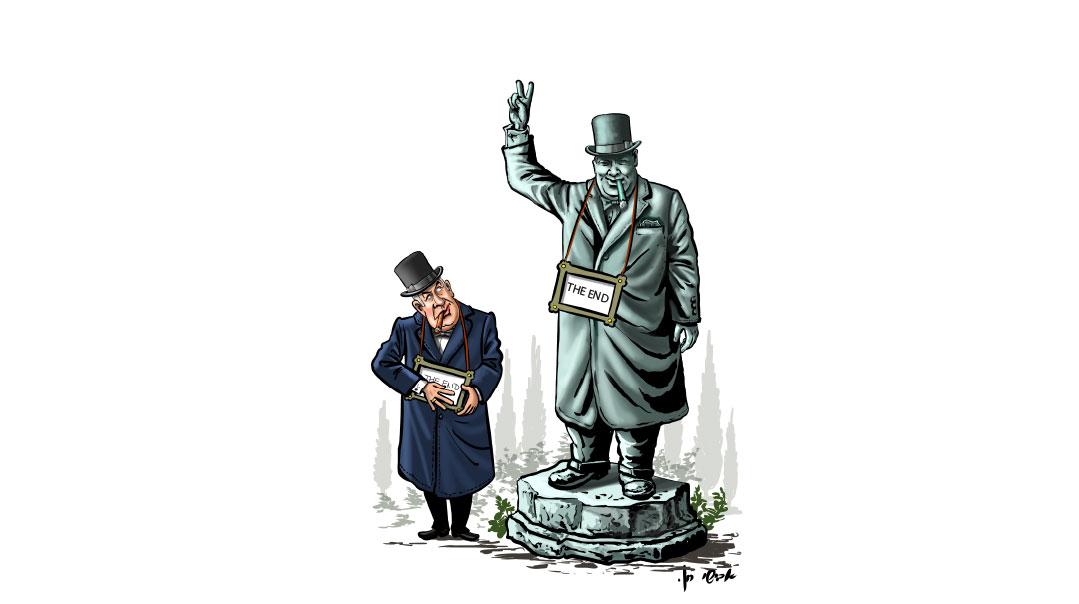Bibi’s Churchill Moment

Netanyahu has come to resemble his hero in two ways he could never have imagined

Two weeks ago, Israel’s prime minister flew to Washington on an aging El Al plane filled with elated officials and euphoric right-wingers to the crowning moment of his career: the unveiling of the Trump Peace Plan. As President Trump read the last rites over the remains of the Oslo accords, Bibi might have been forgiven for pinching himself to see if he was awake.
The White House announcement might have been a dream come true, but on the long transatlantic flight there, sleep was the last thing on Netanyahu’s mind. According to an informed source (Mishpacha’s Hebrew correspondent, taking a midflight amble up the aisle), the prime minister spent the time reading a biography of Winston Churchill.
Bibi’s Churchill fixation is the stuff of journalistic lore. To his detractors, Netanyahu is a wannabe Winston, exaggerating the threat posed by the Iranian ayatollahs for political gain. To his supporters, his long, lonely battle to focus world attention on the Iranian nuclear program recalls Churchill’s wilderness years in the 1930s, fighting the apathetic British response to a rearming Germany.
But as Israel prepares for its third election in a year with a prime minister under indictment, Netanyahu has come to resemble his hero in two ways he could never have imagined.
Start with foreign policy. In the second half of World War II, the British Empire was a crumbling giant. Impoverished and overstretched, it was clear that it belonged to the past, and that America and the USSR would dominate the future.
And yet, according to historian Max Hastings, Churchill’s giant personal stature enabled Britain to claim a place as one of the Big Three, far in excess of its waning national power.
The same is now proving true of Netanyahu. In the first round of elections in April 2019, giant Likud party adverts appeared across strategic junctions in Jerusalem and Tel Aviv. Showing Bibi next to a smiling Trump, the billboards screamed “Bibi — another league.” It was good PR, precisely because it’s accurate.
With all due respect to Israeli egos, the country is not only a tech killer whale, but an economic sardine. The reason a state of eight million people finds itself courted simultaneously by the White House, Kremlin, and assorted Arab capitals is clear siyata d’Shmaya. But in natural terms, it has something to do with its military and intelligence capabilities, and even more to do with Bibi.
Israel’s leader has leveraged his personal prestige to marshal a coalition of Arab states into an alliance against Iran. After Obama’s isolationism let the Russians back into the Middle East, Netanyahu has played his hand brilliantly, hugging President Putin close to enable Israel to continue attacking the Russian-allied Iranians in Syria. And now with the Deal of the Century, Netanyahu has persuaded the Americans to abandon the long-held land-for-peace formula.
It’s something that Netanyahu’s many enemies refuse to acknowledge. A few months ago in the Knesset’s parking lot I had a short conversation with former IDF deputy chief of staff and current left-leaning politician Yair Golan. Why, I asked, was the left so loath to give Netanyahu credit for his achievements? He replied, “Netanyahu takes credit for what the ‘Jewish brains’ in Israel’s high-tech industries have done — it’s not him.”
The good general is wrong. When Menachem Begin chose Moshe Dayan — a long-time political foe — as foreign minister, he explained that he wanted someone formidable enough to make a visiting ambassador straighten his tie before knocking.
Bibi Netanyahu easily makes that grade. But does anyone think that President Putin would respect a Prime Minister Benny Gantz, or Foreign Minister Yair Lapid? Would the Gulf leaders give them the time of day? For that matter, would Trump? The reality of statesmanship is that it’s not just a question of countries’ strength, but of leadership. In that respect, Bibi truly is in another league.
There’s a second Bibi-Winston parallel. In the last days of World War II, the British people held a national election. To international disbelief, the legendary war leader lost to Labor politician Clement Attlee.
Bibi Netanyahu is now staring that same fate in the eyes. Polls show that the diplomatic coup hasn’t moved the voting blocs, and that half of the electorate shrugs its shoulders at whatever rabbits Israel’s prime minister conjures out of his hat.
But if Netanyahu reached the end of that biography on the long flight to Washington, he might have also noticed the differences between himself and Churchill.
Because while the British leader was unseated by a politician with a transformative postwar vision — what ultimately led to the country’s welfare state — Bibi might just be brought down by opponents with no vision to speak of.
The country is begging for new thinking on a cost-of-living crisis, but don’t look to the Blue and White Party to provide it. Their only agenda is holding together their awkward political creation and ousting Netanyahu.
It’s too early to eulogize Israel’s longest-serving prime minister, who, like Churchill, has had multiple political lives. Voters may grasp that Trump’s peace plan needs an experienced leader at the helm and vote for Bibi.
But if they don’t, Bibi’s fate will parallel his hero’s to the bitter end — down to the Churchillian cigars for which he’s being indicted.
(Originally featured in Mishpacha, Issue 798)
Oops! We could not locate your form.













